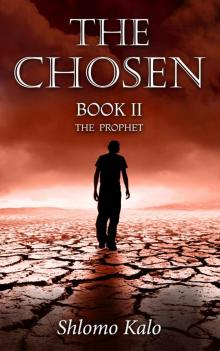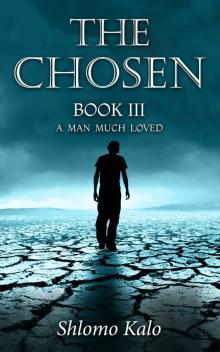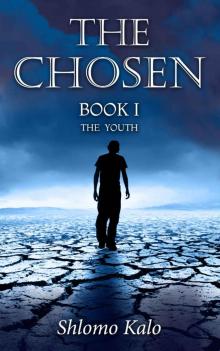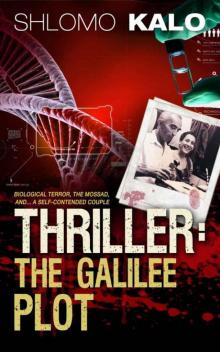- Home
- Shlomo Kalo
THE CHOSEN : The Youth: Historical Fiction (The Chosen Trilogy Book 1) Page 2
THE CHOSEN : The Youth: Historical Fiction (The Chosen Trilogy Book 1) Read online
Page 2
The skies were like the song of angels, telling in measured rhymes, in a melody matching all the aspirations of the heart, legends of long ago.
And he asked her then if she knew the constellations of the sky, if she was aware of the conjunctions of stars that astrologers study and teach, as a means of foretelling the future of a person or of whole nations of the world. And she said she knew only a very little of all this but would be so glad to hear…
And she heard his voice, a voice clear and resonant, with pleasantly modulated words, telling legends of the heroes of old, who fought in the heavens and on the earth, and astrologers predicted their victory or their downfall by means of those gleaming stars. There they are – he pointed out the constellations one after another, and she following him with wide open eyes, her look expressing nothing other than submission to the infinite, and above all, something resembling admiration, frank and proud admiration, bringing a moist veil to her eyes. He absorbed all of this and recalled the verses of Solomon, son of David: Turn away your eyes from me, for they overwhelm me. He saw in his mind’s eye the young Solomon and the young Shulamite, lying on their backs at the edge of a great hayrick, breathing the balmy air of the cropped field, looking up at the sea of stars gleaming above their heads, and Solomon, the future king, revealing to his beloved and cherished Shulamite the secrets of the firmament and she gazing at him with her deep, wide-open eyes, more beautiful than anything that bears the name of beauty, and at this very moment they are sparkling with a moisture that is nothing other than sublime, surpassing all else that is known as sublime.
Love is strong as death… if a man were to offer for love all his worldly wealth, it would be utterly scorned.
For some time thereafter they did not meet again. Indeed – their bodies did not meet, but beyond such limitations, he used to meet her and talk with her at all hours, by day and by night. She was in his heart, as a manifestation of what is “strong as death”, clear, sharp and limpid and above all – uplifting the soul and laying bare the spirit, and opening the doors of the heart to that which never perishes.
There were moments when it seemed to him that meeting in the corporeal sense would spoil and impair those other encounters of theirs, continuing in constant succession, vibrant with the life of truth, in other words – life flowing without check.
And what a surprise it was to him, when after a whole month he went back to walking in the forest of Anathoth and met her near the rosy spring, so called on account of the pink marble rock from which it flowed, and the raspberry bush reflected in its clear waters.
This was the place where they met for the first time and where they had often met in the not so distant past. Her face was pale, but the moment she saw him it changed at once: a red flush spread across it, bespeaking tenderness and gratification, and she skipped gracefully towards him, and dipped the radiant purity of her eyes in his, which could not disguise his astonishment and were replete with overwhelming delight.
“How is this?” he asked awkwardly.
“Simple!” – she answered the question, and he accepted it, and she understood.
“Have you been here long?” – he almost stammered, disconcerted by the dark, bold blue of her eyes, enfolding him on all sides like a gleaming halo, like a mighty ocean bearing him on its pure waves towards a destination of its own choosing.
“And how did you know the time and the place?” – he went on to ask in his bemusement, without pausing for her reply, and beneath the many layers of his confusion seeing the truth and dreading it, unwilling to delve into its depths, fearing lest its joy upset his peace of mind forever.
But she left no room for doubt:
“I didn’t know and I didn’t guess,” she replied.
“What then?” – his voice shook.
“I have been here,” she answered him simply – “from daybreak till sunset.”
“But Nejeen!” – he spoke her name and felt the tingling of his flesh and of hers with it.
“It’s the truth,” she guessed what his next question would be and answered it first.
“Every day?”
“Every day.”
And then she held out her hand and he took it, a white, slender, firm hand. And all at once, as if a sign had been given and without a word spoken between them, they gambolled hand in hand down the slope that was all fields strewn with flowers of every hue and of strong and pungent scent, the scent of endless spring.
Here is the slope. They are approaching the first houses of Anathoth, low houses, huddled together like a flock of sheep, waiting for the storm to break or the wolf to pounce.
This is the kind of dejection which has descended upon so many members of his race, those accustomed to seeing themselves as the elect of God. The envoy of God came into the midst of this people, took his stand in its market-places and attended its gatherings, delivered his speeches in the bustling squares and in the hearing of the gentry, he even made his message known in the palace of the king. His words were clear and grave – and no one listened to them. Instead of this the nobles and the commoners, the ministers and the counsellors and the viziers, and the king himself and in person – they persecuted the envoy of God. Even men of the clergy joined in the chorus of abuse and rejection. The priests charged with the practice of divine service in the Sanctuary, their sons and their pupils, and the Levites, and the officially approved prophets, and the sages speaking out in support of the regime – all of them, as one man, persecuted the envoy of God, scorned him, and slapped his cheeks, and spat in his face.
This is the man he is going to see, the envoy of God who lives the life of a recluse in these dreadful times, in fear and in anguish, unable to leave his home.
His black mare has guided him directly to the house at the southernmost end of the silent, forbidding settlement, its inhabitants peering out through the cracks and crannies in shuttered windows, and half-opened doors, at this strange group, consisting of a Jewish youth and two Chaldean soldiers. They peer, and then slink back into their holes.
No living being has met them on their way, until it seems the settlement is neglected and abandoned, a habitation of ghosts. There is the southernmost house, standing a little apart from the others. Behind it – a broad meadow growing wild.
His heart is beating fast. Already he is prepared to climb down from his mount, to approach the house on foot, ascend the two flights of stone steps – untrimmed Jerusalem stone, coarse but lustrous – push open the light wicket, walk along the narrow path and knock on the massive, grim-looking gate, so heavy it seems no man alone could shift it on its hinges. But he is spared all this effort. Suddenly, without a sound, as if at the touch of a magic wand, the heavy gate swings open and in the dark void beyond stands a man of medium height, thin-fleshed, wearing a striped robe, like those worn by priests when not engaged in divine service. The man’s hair, shoulder-length and longer, and his dangling, straggly beard are streaked with grey, his forehead high and beneath it, set deep in their blue-tinged sockets, those strange eyes are flashing brightly, eyes that are worlds in their own right, unexplored worlds, shafts of light that pierce the void of the universe – nothing can resist them, nothing stand against them, for their source is beyond the control of any mortal.
And the man was drawing closer, crossing the path and descending the two flights of the short stairway. And only then did the youth muster his courage and leap nimbly from the back of his black mare, quaking beneath him, and take two steps forward, to bend the knee and prostrate himself on the ground at the bare feet of the envoy of God, the vessel of the word of God.
The Chaldean soldiers also dismounted, and they too knelt and bowed, prompted by some sudden impulse, before this strange man, doing just as he was doing, the youth whom they were escorting, whether as a prisoner or as a future guest of their king.
“Rabbi, my master and my teacher!” cried the youth in a choking voice: “How many are my sins against him and against He who sent him! My sins, and the
sins of my masters and my parents and my fellow-countrymen in all their teeming hordes!”
“You are not the sinner, Daniel sweet youth!” – the man interrupted him in his wondrously clear, courageous voice, with not a single note out of place: “You are blessed by the Almighty God whom I serve. It is He who has called me to come out and meet you, and told me your name, and commanded me to inform you that great mysteries will be revealed to you, and the most arcane of secrets you shall know, and His name you are to uphold in a distant land, and lords of the land and kings shall listen to the word of the Lord issuing from your lips, and great and mysterious things you shall accomplish for the sake of His glory and the holiness of His name, and many shall hate you and very few will understand you, and they are the ones who will be saved at the end of time.
“And now arise, young Daniel, and set out on the way that has been ordained for you!”
“Not until you have blessed me, father Jeremiah, prophet of God the most high!”
“May God be with you whatsoever you do and wheresoever you go!” – Jeremiah blessed the youth, and added with a faint smile: “Although that is not so much a benediction as a simple observation, for even before you were in the womb God was with you and to the end of your days on this earth He will not forsake you, for you are very dear to Him and are numbered among His children! He shall show the way that you must walk until you are gathered to Him, forever and ever, amen!” – and so saying the man leaned forward and lightly touched the head of the youth, then turned and with vigorous, measured tread, returned the way he had come.
When Daniel rose to his feet the void was empty again and the house silent and closed, as he had seen it just a short while before. The gate was locked, locked and bolted, heavy and forbidding.
He mounted his mare and realised he had done this with unwonted lightness, with agility, in high spirits even. The Chaldean soldiers followed his example and they too seemed more cheerful, as a sort of distant flush tinged the edges of their cheeks, areas untouched by their neatly trimmed beards. His brown eyes gleamed. He urged on his mare without giving a moment’s thought to her debilitated condition but – and here was a positive miracle – she responded to his commands and settled into a steady gait, treading lightly as she climbed the incline of the road from Anathoth.
The words of the prophet reverberated in the turbulent soul of the young man. The lines of his face, delicately crafted yet bold, were enlivened by remarkable vigour, without revealing the merest hint of his innermost thoughts. Thus he had been taught by his tutors who constantly repeated to him one of the sayings of the wisest of men: Better be slow to anger than be a mighty warrior, better control your temper than conquer a city.
The young features were handsome, although expressing a composure at odds with his age. His hair was black, raven-black, silky-smooth and clean, combed back and falling to his shoulders, his forehead a startling white, high and smooth. The expression of his face spoke of absence of fear, as if cleansed of the last vestige of worldliness.
He called to mind once again the encounter that he had longed for so much, the words he had just heard, the words he had uttered. Everything so different from what he had envisaged, surprising and embarrassing, and continuing to perturb his spirit. Had the die really been cast, had he been assigned the far from easy task of preaching the word of God before the rulers of foreign lands? Would they believe him? He saw no purpose in attempting to answer his own questions, and they remained suspended in the void, a source of anxiety and stress – and of untempered delight.
He revealed to no one his wishes and his latent longings, and indeed there was no need for this, since He, his father in Heaven, his God, always listened to the meditations of his heart, and guided him on the way that led to Him.
He had heard tell of Jeremiah and knew he was the true emissary of the living God, and he took his side, sometimes in silence, sometimes with a sentence or two, inside his house and outside it. In time it became known to him that his father too was on the side of Jeremiah, but because of his exalted status and his respect for the king he could not express this publicly, only in the presence of the king and his inner circle of advisers. The king and his entourage, with the exception of his father and possibly his uncle too, his mother’s brother, did not accept the yoke of the Chaldeans and refused to believe that they had brought it upon their own necks, with their departure from the Holy Torah and their rejection of God, speaking through His prophet and saying: Not by might and not by power but through my spirit, meaning – cleave to me, keep my commandments, and you have no one to fear and nothing to dread, for I am your defender, your redeemer and deliverer and no power on the earth, however great it may be, can do you harm.
They did not understand anything, or it would be more true to say – they refused to understand. Their pride was hurt, and instead of seeking out the source of their downfall in themselves, they accused God of abandoning them and forsaking them, and selling them to their enemies.
It was painful, looking into the faces of his father’s friends, the ministers and advisers and leaders of armies, and seeing how their eyes flashed with resentment at the cruel fate allotted them. And when the Prophet appeared, the true emissary of the living God, and called on them to repent, and foretold the future, they vented their anger on him, blaming and abusing him, threatening him with torture, exile, imprisonment… and the man of God endured it all and was not deterred. Threats were of no avail, and yet those who threatened were unabashed and unrepentant.
That was when he began praying for the soul of his father, and the soul of the misguided king, and of the people, led astray through no malice of their own. And his prayers were heard and the way to salvation was revealed for all to see, but it was not as those destined for salvation had envisaged it; it seemed to them this was not the way of salvation but the way of suffering, of destruction and of ruin.
Before they knew it, they had reached the ravaged wall of the Holy City, the capital city of the people of God. This is the site of the Humble Gate, lowest of all the gates, with just enough space for a horse and rider to pass through it, and it used to be the pedlars’ gate. Only a few years ago the place had been thronged with pedlars, hawking their various wares and blocking the path of anyone trying to pass by.
Today it is just an aperture with no breath of life about it. An aperture leading to a cemetery. Has the city of the faithful turned into a cemetery? Judging by the wraiths presiding over it, there is little to choose between city and cemetery. Graves – is that not what these houses are, houses where only the sounds of grief and bitter weeping interrupt their mournful stillness? Has this city breathed its last? Not yet. The Prophet Jeremiah predicted the renewal of its youth seventy years from now, when its inhabitants are cleansed of all their defilement and a new generation comes, the generation of great hope, and build upon its ruins, laying firm foundations of righteousness, truth and justice, and God dwells in it once again, as in the first days and as He promised to His people, the God who is love.
At home a surprise awaited him. His friends, Hananiah, Mishael and Azariah, were sitting in his room waiting for him patiently, their belongings packed at their feet, and faint smiles on their young faces, while beside them Ashpenaz, the chief eunuch and envoy of Nebuchadnezzar, who had come to collect “children” as he called them, children of outstanding talents, was incandescent with rage. He hurled all kinds of senseless accusations at his soldiers, denouncing them as wastrels and halfwits, deserving only the executioner’s sword. And all this because they did not spur on their horses and arrive early. And there was no point in making excuses here, since Ashpenaz was clearly in no mood to listen to excuses. Especially as the officer who sent them had been transferred elsewhere and there was no one who would dare to remind the furious Ashpenaz that the riders were required to return not later than midday, and as it was not yet midday, they were in fact ahead of schedule.
When Ashpenaz the chief eunuch had expended his anger on hi
s soldiers, he turned to them and commanded them to make haste to the square by the elegant gate, where the convoy about to leave for Babylon had been delayed by the irresponsible behaviour of two of his soldiers, who would yet pay the penalty, as would the officer who had authorised their absence.
The youth regretted the punishment that was in store for the Chaldean officer, but in his heart he rejoiced at the opportunity that he had been given, looking into the face of the true man of God, the dauntless prophet of his father in Heaven, hearing his blessing and parting from him in peace.
He bade hasty farewells to his mother and his two sisters and his brother in the cradle, his nurse and his grandmother and all the slaves and family retainers. His mother held back her tears, as did his nurse. His sisters were too young to realise what was happening, the slaves wept softly, as did the maidservants. He took his bundle and set out with vigorous tread for the main entrance of the house. An old slave trailed along behind him, and accompanied him as far as the outer door. From here he carried on with his three companions.
The Convoy
The commander of the convoy, a Chaldean officer, grim-faced like most of the all-conquering Chaldeans, put them, the four of them, on one of the wagons that were covered with canopies of cattle-hide for shade, and crammed with youths like themselves, the scions of noble families, summoned by the king of Babylon to serve in his palace.
The officer spurred his thoroughbred horse along the line of the convoy, composed of wagons, men and beasts, inspected whatever it was that required his inspection, retraced his steps and ordered his equerry to shoot off three burning arrows into the bright blue sky, the pre-arranged signal for the convoy leaders to move. And sure enough, as soon as the arrows had fallen to the ground and been extinguished in the whitish-grey dust of the roadside, a kind of stirring was sensed among men and beasts alike. Most of the people carried knapsacks on their hunched shoulders and walked, barefoot as a rule, close to the long wagons and leaning on them for support. The majority of the wagons were open to the blazing sun and carried all kinds of cargo and a few passengers. Besides the pairs of horses harnessed to the wagons, the pampered little ponies of the Chaldean cavalry, escorting the convoy of exiles, many of them artisans – were everywhere to be seen. About a dozen oxen, a source of fresh meat for the Chaldean army, and some half dozen milch-cows, for the provision of fresh milk, trailed along ponderously in the rear.

 THE CHOSEN : The Prophet: Historical Fiction (The Chosen Trilogy Book 2)
THE CHOSEN : The Prophet: Historical Fiction (The Chosen Trilogy Book 2) THE CHOSEN: A Man Much Loved: Historical Fiction (The Chosen Trilogy Book 3)
THE CHOSEN: A Man Much Loved: Historical Fiction (The Chosen Trilogy Book 3) The Fantastical Adventures of Leutenlieb of the House of Munchausen
The Fantastical Adventures of Leutenlieb of the House of Munchausen THE CHOSEN : The Youth: Historical Fiction (The Chosen Trilogy Book 1)
THE CHOSEN : The Youth: Historical Fiction (The Chosen Trilogy Book 1) THRILLER: The Galilee Plot: (International Biological Terror, The Mossad, and... A Self-contended Couple)
THRILLER: The Galilee Plot: (International Biological Terror, The Mossad, and... A Self-contended Couple)